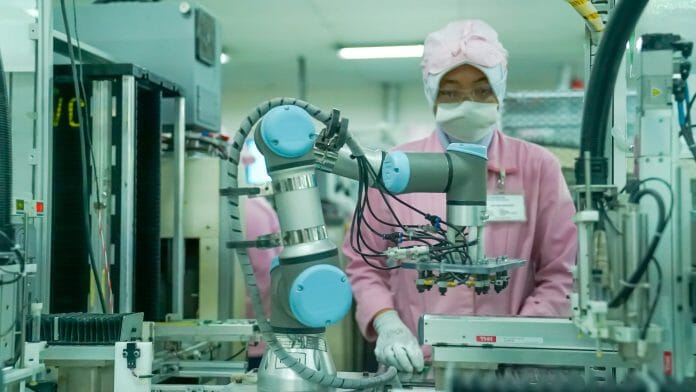Universal Robots (UR), the global leader in the rapidly growing market of collaborative robots (cobots), has advised the manufacturing industry in Malaysia to accelerate automation adoption through deployment of cobots to maximise growth within the sector.
According to Economic & Fiscal Outlook and Revenue Estimates report 2023, Malaysia’s manufacturing sector has been showing steady expansion, expanding by 8.1 per cent in 2022 as rising global demand and growth in domestic industries further supported production activities.
Despite such steady growth, many businesses in Malaysia have yet to fully leverage Industry 5.0, with much work to be done to realise its potential and fully tap into the projected robotics market projected to be worth US$273.61 million by 2027.
Industry 5.0, also known as the Fifth Industrial Revolution, is the integration of advanced technologies such as artificial intelligence, the Internet of Things, and robotics into the production process. In Malaysia, this new era of industrial production promises to bring greater efficiency, increased productivity, and improved safety, as well as new products and services.
Manufacturing’s Importance to the Economy
Through an impressive Gross Domestic Product (GDP) growth rate of 8.7%, it was revealed earlier in February that Malaysia’s economy exceeded expectations in 2022. Notably, it grew at the fastest pace within Southeast Asia, outpacing the likes of Singapore and Thailand. Malaysia closed the year with the manufacturing sector contributing to 24% of her GDP, showcasing growth of 3.9% within the sector when compared to Q3 of 2022.
In its recent revised 2023 Budget, the Malaysian government has also announced a RM50 million matching grant to encourage automation in plantation sector through use of robotics and artificial intelligence.
Automation adoption in Malaysia’s manufacturing and industrial industry still trails behind the global average. According to the International Federation of Robotics (IFR), Malaysia’s robot density per 10,000 employees is not just below the global average, but is trailing the likes of Southeast Asian neighbours Singapore and Thailand. Their latest report found that Malaysia’s robot density was 55 per 10,000 employees – about 12 times less compared to Singapore’s 670 per 10,000 employees.
Adopting Automation to Maximise Growth
Harnessing the power of automation could be the key to further growing the economy, propelling the nation’s burgeoning manufacturing sector into Industry 5.0 and fully realising its potential. According to Marvin Ming, Country Manager of Universal Robots Malaysia, there are several reasons why adopting automation maximises growth:
“Firstly, automation increases productivity and efficiency by reducing the time required to complete tasks and minimising the risk of errors,” he said. “This can lead to higher production output and lower labour costs, which can improve a company’s bottom line.”
Automation can then improve product quality and consistency, which can lead to higher customer satisfaction and loyalty. This will result in increased sales and revenue for businesses in the country. Automation can also enable companies to scale their operations more easily, allowing them to expand their production capacity and product lines. In turn, this helps companies meet growing demand and capture new market opportunities, which can lead to increased revenue and profits.
“Automation can help companies reduce waste and optimise their use of resources, which can result in cost savings and improved efficiency,” he added. “This enables companies to invest in new technologies and innovation, which can help drive long-term growth and success.”









